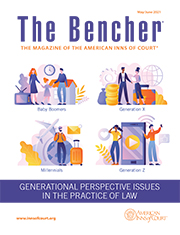Professionalism Perspectives on Court Proceedings via Zoom
The Bencher—May/June 2021
By Francis G.X. Pileggi, Esquire

 When I began writing this ethics column for the American Inns of Court about 25 years ago, I doubt if the technology for conducting court proceedings via Zoom, or similar technology, was widely available to the masses—or that courts would consider it as a routine method of handling their docket. This column will focus on how recent court rulings have addressed standards of professionalism in light of recent technological developments for remote proceedings.
When I began writing this ethics column for the American Inns of Court about 25 years ago, I doubt if the technology for conducting court proceedings via Zoom, or similar technology, was widely available to the masses—or that courts would consider it as a routine method of handling their docket. This column will focus on how recent court rulings have addressed standards of professionalism in light of recent technological developments for remote proceedings.
This brief foray into this topic will not address technological issues per se, such as when this author logged in online 20 minutes early for a court hearing via Zoom, but a few minutes prior to the start of the hearing my audio function inexplicably went silent. Someone from my firm’s IT Department, who I insisted be present in person, finally restored the audio with the assistance of the court’s staff, but without finding the root cause of the glitch. I have no advice on how to avoid problems that may be unavoidable, other than hoping the court will be forgiving of problems that may be out of one’s control, though as time goes on courts may become less tolerant of technology glitches.
Court Decisions
A letter ruling by the Delaware Court of Chancery in Macrophage Therapeutics, Inc. v. Goldberg, C.A. No. 2019-0137-JRS (Del. Ch. Dec. 3, 2020), addressed issues that arose in connection with a non-Delaware lawyer who had a problem with wearing a tie during a remote hearing.
The court refused to “consider an application” from the attorney involved who was not wearing a tie, one day after the court reminded all counsel that proper courtroom attire would be required for the continuation of the remote court proceedings. Notably, the Court of Chancery many years ago published guidelines for practitioners that specify the type of proper attire that must be worn for court appearances.
After the court advised all counsel that proper courtroom attire would be required, the next day the attorney involved appeared again during the proceeding without a tie. The court refused to allow the attorney to continue with his argument. The attorney then submitted a letter to the court indicating that the attorney had a medical condition that prevented him from wearing a tie. In the course of allowing the attorney to proceed due to his medical condition, as an accommodation, the court required that the attorney submit, under seal, medical evidence that his condition would prevent him from wearing proper courtroom attire.
In the course of its letter ruling allowing for the accommodation due to the asserted medical condition, the court took the opportunity to explain the reasons for requiring proper courtroom decorum. For example, the court noted that “the reason judges don judicial robes and counsel dress in business attire for court is to project a unified recognition of the solemnity of the occasion. These are meaningful gestures that reflect respect for the litigants, their cause, their counsel, the judge, and the court.”
The court also observed the truism in Delaware that “the concept of ‘local counsel’ whose role is limited to administrative or ministerial matters has no place in the Court of Chancery. The Delaware lawyers who appear in a case are responsible to the court for the case and its presentation.”
Depositions
Depositions are often referred to as quasi-court proceedings, and a Pennsylvania court recently had occasion to opine on the penalties for minimum standards not being followed for a remote deposition. In the matter of Shimkus v. Scranton Quincy Clinic Company, LLC, 2020 WL 7346570 (Pa. Com. Pl., Dec. 7, 2020), the Court of Common Pleas of Lackawanna County, Pennsylvania, imposed penalties on a lawyer for surreptitiously supplying answers to a deponent during a videotaped remote deposition. The lawyer was not visible on the camera even though the notice of deposition specified several conditions for the remote videotaped deposition, including that “participating attorneys must be visible to all other participants during the deposition.” The attorney in question was found to have provided the witness with answers “off-screen” to questions posed during the deposition.
In some jurisdictions, counsel are permitted to discuss the substance of the deposition during breaks, but in this instance the coaching took place during the deposition itself. By comparison, in Delaware, attorneys are not permitted to discuss the substance of the deposition with a deponent even during breaks in a deposition, unless it involves one or two very limited exceptions. In the Shimkus case, even though the deponent and the attorney involved denied any coaching, the court found after viewing the video clips that there was no doubt coaching occurred. The court imposed several penalties, including preventing the deponent from testifying at trial as to any of the items specifically identified as being the subject of the coaching during the deposition.
Other Guidelines
Regarding specific guidelines to follow during remote depositions, several courts have entered stipulated orders providing extensive guidance to address how to avoid problems that might not otherwise arise when a deposition takes place with all persons involved being present. See, e.g., Snow Phipps Group LLC v. KCAKE Acquisition, Inc., No. 2020-0282-KSJM, Stipulated Order (Del. Ch. Sept. 30, 2020); see also protocols established by Magistrate Judge Richard W. Lehrburger of the U.S. District Court for the Southern District of New York.
A special rule for remote depositions is about to be implemented by the Commercial Division of the trial courts in New York. Many courts have also established new rules and procedures for trials via Zoom, or other web-based video proceedings, using services such as CourtScribes and AgileLaw.
Many articles are also available that discuss the details and nuances of conducting a court proceeding by videoconferencing. For example, one good tip is to make sure the camera is positioned so that the attorney is looking up at the camera, just as one would be looking up at the judge on the bench in a courtroom. If the camera during a hearing via Zoom is positioned so that the attorneys are looking down at the camera, and therefore looking down at the judge, it is not an ideal situation. In addition, a well-known admonition is to avoid anything in the background during a video conference that would be distracting. A plain mono-colored wall is typically best.
All the rules have not been written yet for best practices to follow for court proceedings held remotely, nor have all the parameters of professionalism for these new procedures been fully defined. A safe guiding principle would be to try—to the extent possible—to simulate conditions that would prevail if one were physically present in a courtroom.
Francis G.X. Pileggi, Esquire, is the managing partner of the Delaware office of Lewis Brisbois Bisgaard & Smith, LLP. He comments on key corporate and commercial decisions and legal ethics topics at www.delawarelitigation.com.